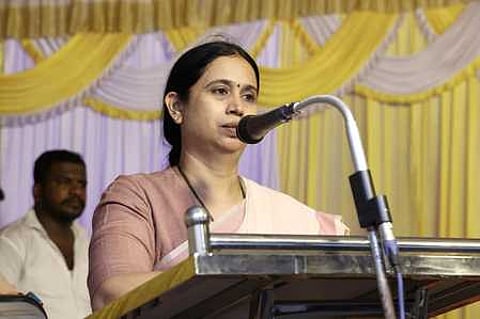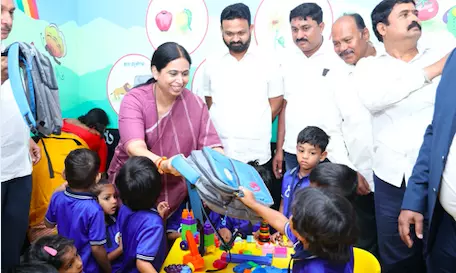The Karnataka government is considering a groundbreaking policy that could provide orphaned children with a special quota in education. Women and Child Development Minister Laxmi Hebbalkar announced in the Assembly that the proposal is under active discussion. The move is aimed at recognizing the unique struggles faced by orphaned children, who often lack the family support and social networks that help others thrive. By placing them under a separate category, the state seeks to ensure that they are not left behind in the competitive race for education and opportunities, thus addressing systemic disadvantages.
The proposal stems from growing awareness that orphaned children remain one of the most vulnerable groups in society. Despite existing reservation systems, these children often fail to access quality education or government benefits due to lack of representation in specific categories. Officials have argued that traditional caste-based quotas do not adequately reflect their plight. The government believes that introducing a distinct category would offer them fairer access to higher education, professional courses, and other avenues for upward mobility. Minister Hebbalkar stressed that the initiative is not about politics, but about compassion, inclusivity, and justice for neglected sections.
The announcement has sparked both hope and debate across Karnataka. Many social activists have welcomed the idea, calling it a humane step toward bridging social inequality. At the same time, experts have cautioned that implementation details will be crucial, especially in defining eligibility and ensuring transparency. Legal scholars have also pointed out that any new quota system must align with constitutional provisions. For now, the proposal reflects Karnataka’s attempt to expand its welfare vision and highlight a segment of children whose voices are rarely heard.
Government’s Vision and Social Impact
Minister Hebbalkar emphasized that the proposed quota would not only uplift orphaned children but also redefine the state’s welfare priorities. She said the government was keen on framing education policies that directly address vulnerable groups. Orphaned children, who often lack guardianship, financial support, or even proper identification, face significant hurdles in enrolling in schools and colleges. A quota system, she argued, could act as an equalizer, giving them the confidence to pursue higher education. Activists have hailed the move as a moral responsibility of the state, noting that education remains the most effective tool for breaking cycles of poverty.
However, the idea has faced scrutiny from some quarters. Critics have warned that introducing a new special category may trigger political backlash from groups demanding their own sub-quotas. Questions about overlap with existing categories, particularly economically weaker sections, have also been raised. Policy experts have called for careful study to prevent misuse and ensure genuine orphans benefit. The state is reportedly consulting child rights groups and legal experts before finalizing the framework. Despite the concerns, supporters argue that the emotional and social value of this step outweighs the challenges. They believe Karnataka could set a precedent for other states to follow.

The announcement in the Karnataka Assembly by Minister Laxmi Hebbalkar has set off intense conversations across educational institutions, welfare groups, and political circles. Many educationists have highlighted that this could be a landmark move if implemented correctly, since orphaned children are among the least represented demographics in higher education. Unlike other groups who have caste or community-based representation, orphans often lack any lobby to fight for their rights. This silence has historically left them invisible within policymaking frameworks, making this proposal both symbolic and practical in addressing their absence from systemic benefits.
Social workers in Karnataka have pointed out that orphaned children often drop out of schools at higher rates due to lack of support structures. Without families to guide them, even accessing existing schemes can be difficult. The proposed quota could act as a dedicated support system, ensuring that their educational journey is not cut short due to circumstances beyond their control. Organizations that run orphanages have stated that even children who excel in academics face structural discrimination when competing for seats. By creating a special category, the government is recognizing that equality is not just about uniform rules, but about equitable opportunities.
Political reactions to the move have been mixed. While ruling party members have welcomed the minister’s statement as a bold and compassionate step, opposition leaders have warned that such decisions should not be made hastily. Some argue that the quota system in India is already overcrowded with demands from multiple communities. Adding a new category, they claim, might lead to legal disputes and administrative confusion. However, supporters counter this argument by saying that orphaned children are not a caste or community, but a vulnerable group that cannot be ignored. This distinction, they believe, makes the case morally and constitutionally stronger.
Legal experts have underlined that the state must carefully define what qualifies as an orphan in order to prevent misuse of the quota. Past experiences with welfare schemes show that loopholes often lead to fraudulent claims. Experts suggest that eligibility should be based on certificates verified by government-run child welfare departments rather than just affidavits. They also recommend that the quota be limited to genuine cases where children have no parents or reliable guardians. By laying down strict conditions, the government can avoid both exploitation and legal challenges that might derail the policy before it can achieve its intended impact.
On the ground, orphanages and NGOs have expressed cautious optimism. Many say that education is the only lifeline for children under their care. While shelter homes provide basic needs, higher education remains out of reach due to intense competition and financial barriers. With a special category quota, students could access professional courses like engineering, medicine, and law, which would otherwise remain unattainable. Leaders of child rights organizations have urged the government to also include financial support, such as scholarships and hostel facilities, since reservation without funding assistance might not be enough to truly empower orphaned children.
Way Forward
As discussions continue, the proposal has ignited a larger debate on how India addresses the needs of orphaned children. The government is expected to study national and international models before drafting the policy. If approved, Karnataka will become one of the first states in India to recognize orphans as a separate educational category. The initiative has the potential to not only change lives but also reshape social justice frameworks. For now, the move is being seen as a deeply compassionate step, reflecting both moral duty and political will to stand by society’s most vulnerable.

Teachers and academic institutions have reacted with both hope and apprehension. Some principals from government colleges have noted that while the idea is noble, the implementation will require clear instructions from the education department. They point out that admissions are already highly competitive, with multiple reservation categories creating administrative complexities. Introducing a new category will mean new allocation systems, database management, and verification processes. However, most educators agree that the moral necessity of the move outweighs the logistical challenges, especially if it ensures that orphaned children are not left to struggle alone in an increasingly competitive academic environment.
Beyond Karnataka, child rights activists from across India have praised the proposal as potentially precedent-setting. If Karnataka successfully implements this category, it could encourage other states to follow suit. Some activists have even suggested that the central government consider adopting a nationwide policy for orphaned children. They argue that children without families are among the most disadvantaged citizens of the country and deserve focused welfare measures. National recognition, they say, would not only standardize benefits but also protect orphans from regional inequalities in education opportunities, thereby creating a more just and inclusive system across India.
The emotional appeal of the proposal has also resonated strongly with citizens. Many ordinary people, especially those who grew up in difficult circumstances, have voiced their support on social platforms. They see it as an acknowledgment of the silent struggles of thousands of children who grow up in institutions or foster homes without family backing. The sentimental tone of the debate has reminded lawmakers that policy decisions must not only address numbers but also human stories. By treating orphaned children as a special category, the government is sending out a message that compassion is as important as political calculation.
At the same time, concerns remain regarding the broader impact on reservation politics in Karnataka. Several communities that are still pressing for increased quotas have argued that the state is stretching its resources too thin. Some leaders have claimed that introducing a new category could lead to unrest among other groups waiting for sub-quota recognition. However, defenders of the move stress that orphaned children cannot be equated with caste or community demands, since they represent a humanitarian concern rather than a political one. They insist that moral responsibility should outweigh competitive claims in this particular case.
Looking ahead, the proposal may undergo detailed scrutiny by committees before it takes the form of legislation. The government is expected to consult legal experts, education boards, and child rights commissions before finalizing the framework. Minister Hebbalkar has assured that no decision will be taken in haste and that the state will prioritize both fairness and compassion. If executed effectively, this policy could become a milestone in India’s welfare history, marking Karnataka as a pioneer in recognizing orphaned children not as neglected shadows of society, but as individuals deserving equal opportunities to dream, learn, and succeed.
Follow: Karnataka Government
Also read: Home | Channel 6 Network – Latest News, Breaking Updates: Politics, Business, Tech & More

